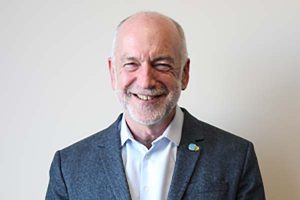
Our Founder
Neil Jameson CBE
UK Welcomes Refugees is the brainchild of the late Neil Jameson CBE – a towering figure in the field of UK community organising for almost 30 years.
Neil launched the East London Citizens Organisation (Telco) in 1996 and later the campaigning organisation Citizens UK and the Living Wage Campaign in 2001.
In his later career Neil became passionately interested in the plight of refugees, and was instrumental in bringing together UK faith and civic society organisations in 2015 to pioneer a new community-led form of resettlement in the UK – the Community Sponsorship Scheme.
It was whilst working on the gestation of Community Sponsorship that Neil first met and became close friends with our Chair of Trustees, Mark Wiggin, and with Sean Ryan MBE, who has the daunting task of honouring Neil’s huge legacy as our CEO following Neil’s sudden and tragic death in April 2023 from a previously undetected cancer.
Neil further boosted the success of Community Sponsorship by launching ‘Sponsor Refugees’ a refugee resettlement delivery initiative that Neil sensibly, if ultimately unsuccessfully, sought to decouple from the campaigning work of Citizens UK before retiring as their Director; a proposal that met with fierce resistance.
Undeterred, Neil went onto establish UK Welcomes Refugees with a mission to maintain close relationships, of trust, unity and reciprocity between the many faith and civic society organisations involved in Community Sponsorship, very much including Citizens with Neil’s typical grace and humility.
UK Welcomes Refugees seeks to honour Neil’s huge legacy by blending his twin passions – strengthening local communities and supporting newcomers to the UK.
Telco had comprised a collective of East London churches, mosques and local community institutions who joined forces to alleviate some of the many hardships and challenges facing local people.
An early victory that Neil remembered fondly was managing to persuade a lard factory in Canning Town to install a filter to alleviate the longstanding stench that had been blighting the lives of local residents.
When a wider community listening exercise identified poverty wages as the single most pressing and unifying issue across the community, the idea of a Living Wage Campaign began to take shape.
Officially launched in 2001, the campaign put local people at the centre, and initially comprised high-profile targeting of local employers that were outsourcing employment to third parties to drive down wages and working conditions. Thanks to the campaign, Barclays Bank became the first in the City of London to agree to pay the Living Wage.
Supported by campaign colleagues, in 2003 a local cleaner at HSBC Bank attended the bank’s AGM and gracefully confronted the bank’s Chair Sir John Bond, telling him: “We receive a whole £5/hour, no pension and a miserly sick pay scheme. Our children go to school without even an adequate lunch”. HSBC Bank and many other corporations soon followed Barclays Bank and adopted the Living Wage.
In 2005, then Mayor of London Ken Livingstone agreed to adopt the Living Wage for all staff at City Hall and all municipal workers. Around 14,000 employers are now accredited as Living Wage employers.
In a notable demonstration of the power of community organising, shortly before the 2005 general election David Cameron and Gordon Brown both agreed to appear at a mass rally organised by Neil and colleagues at Methodist Central Hall, at which one low-paid worker after another contributed deeply moving testimony about the impact of poverty wages on them and their families.
Gordon Brown gave one of the speeches of his life, telling the assembled organisers: “If you fight for fairness, you will always find in me a friend, a partner and a brother.”
David Cameron told the assembled activists: “You are the Big Society”.
Whilst Brown’s career in frontline politics soon ended in ignominious defeat, and Cameron later delivered crippling cuts to local government and communities from which most are yet to recover, the message was already born that local people organising together at a local level can deliver real change.
In 2015 Neil said: “I’m most proud of reviving political assemblies as the political tool for non-partisan people to show their power … If you have a packed room, in a democracy people have to come to you”.
Born in Tynemouth, Neil was the son of salesman Eric and his devoted Violet who met as Sunday School teachers. Whilst still at Solihull School, Neil met his future wife, Jean Bird, who went to the neighbouring girls’ school. Jean had the lead role in the schools’ joint production of Curtmantle by Christopher Fry – whilst Neil was selling the tickets! The pair attended different universities but kept in close touch, undertaking Voluntary Service Overseas (VSO) together in Sudan following their graduation. They were married in 1970.
In his early career, Neil had been a social worker and local government officer before going onto work for children’s charities. Those experiences helped sow the seeds for Neil’s later work, empowering local people to come together and organise for the good of their families and wider community.
Neil was a committed Quaker whose political outlook was deeply informed by his faith – though friends and colleagues say he wore it lightly.
Neil’s ‘Who’s Who’ entry describes his ‘hobbies’ as: “strengthening civil society, promoting democracy, tennis and optimism”
All those who had the privilege of knowing and working with Neil will attest that Neil had a unique and precious gift for making each and every person he met feel like the most important person in the world.
Neil was awarded a CBE in 2016 for his then 20+ years’ work to establish and grow community organising in the UK.
Neil is survived by Jean, their four children, Ben, Ella, Will and Charlie and seven grandchildren.
© Copyright 2022 UK Welcomes Refugees
Registered Charity No. 1195770. Company No. 12679315.
Privacy Policy
Website by Piranha


